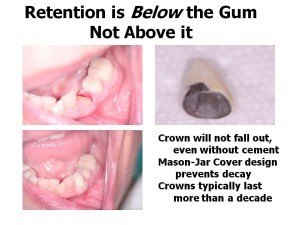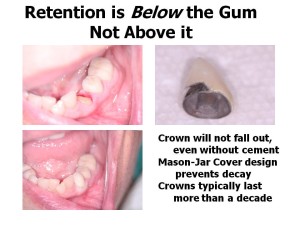
Do crowns fall out? Dental crowns are indeed a common solution for restoring damaged teeth, and there are various reasons why they may become loose or fall out. These reasons include decay, issues with the cement seal, and biting down on hard objects. Promptly seeing a dentist in case of a loose or fallen-out crown is crucial, as is maintaining good oral hygiene and attending regular dental check-ups to prevent such issues.

Do Dental Crowns Fall Out?
Dental crowns are a common dental restoration used to cover and protect damaged or weakened teeth. While they are designed to be durable and long-lasting, there is always a possibility that a dental crown can fall out. This can be a concerning situation for individuals who have invested time and money into their dental crown. In this article, we will explore the reasons why dental crowns can fall out and what steps can be taken to prevent this from happening.
Do Dental Crowns Can Fall Out-The Reason
When a dental crown falls out, it is usually due to one of the following reasons:
1. Decay: If the tooth beneath the dental crown becomes decayed, it can weaken the bond between the tooth and the crown, causing it to become loose and eventually fall out.
2. Trauma or Injury: A blow to the mouth or biting down on a hard object can cause a dental crown to dislodge. This is more likely to happen if the crown was not properly fitted or if there is an underlying issue with the tooth structure.
3. Poor Oral Hygiene: Neglecting proper oral hygiene, such as regular brushing and flossing, can lead to gum disease or tooth decay, which can weaken the tooth structure and cause the dental crown to become loose.
4. Tooth Grinding or Clenching: Habitual teeth grinding or clenching, known as bruxism, can put excessive pressure on the dental crown, causing it to loosen over time.
5. Age and Wear: Dental crowns, like any dental restoration, have a lifespan. Over time, the cement used to secure the crown may weaken, causing it to become loose and fall out.
Preventing Dental Crowns from Falling Out
While it is not always possible to prevent a dental crown from falling out, there are steps that can be taken to minimize the risk:
1. Maintain Good Oral Hygiene: Brushing twice a day, flossing daily, and visiting the dentist regularly for check-ups and cleanings can help prevent decay and gum disease, which can weaken the tooth structure supporting the dental crown.
2. Avoid Hard and Sticky Foods: Chewing on ice, hard candies, or sticky foods can put unnecessary stress on the dental crown and increase the risk of it coming loose.
3. Wear a Mouthguard: If you grind or clench your teeth, wearing a mouthguard at night can help protect your dental crown and prevent damage.
4. Address Tooth Decay or Gum Disease Promptly: If you notice any signs of tooth decay or gum disease, such as tooth sensitivity, gum inflammation, or persistent bad breath, seek dental treatment as soon as possible to prevent further damage to the tooth and the dental crown.
5. Schedule Regular Dental Check-ups: Regular visits to the dentist allow for early detection of any issues with the dental crown or the underlying tooth structure. Your dentist can identify and address any concerns before they lead to the crown falling out.
In conclusion, while dental crowns are designed to be durable and long-lasting, there is always a risk of them falling out. Decay, trauma, poor oral hygiene, tooth grinding, and age can all contribute to a dental crown becoming loose and eventually falling out. However, by maintaining good oral hygiene, avoiding excessive force on the crown, wearing a mouthguard if necessary, and addressing any dental issues promptly, you can minimize the risk of your dental crown falling out and ensure its longevity.
Key Takeaways: Do Dental Crowns Fall Out?
- Dental crowns can sometimes fall out due to various reasons.
- Poor oral hygiene can increase the risk of dental crowns falling out.
- Biting into hard or sticky foods can cause dental crowns to become loose.
- Teeth grinding or clenching can put additional pressure on dental crowns and lead to their displacement.
- If a dental crown falls out, it is important to contact a dentist as soon as possible for evaluation and possible re-cementation.
Frequently Asked Questions
Why do dental crowns fall out?
Your summary highlights two additional significant reasons why dental crowns may fall out: improper fit or placement and poor oral hygiene. These factors can indeed contribute to the instability of dental crowns, emphasizing the importance of skilled dental work and maintaining good oral health to prevent such issues.
Can a dental crown fall out years after it was placed?
Your summary effectively captures the key points about dental crowns, their potential for falling out, and the importance of promptly seeking dental care if a crown becomes dislodged. It emphasizes the durability of dental crowns while acknowledging the various factors that can lead to their displacement. Overall, it provides a clear and concise overview of the topic.
What should I do if my dental crown falls out?
If your dental crown becomes dislodged, act swiftly. Preserve the crown, avoid chewing on that side of your mouth, and reach out to your dentist immediately for an evaluation. They will assess the situation and offer necessary treatment. As a temporary measure, you can use dental cement or toothpaste to reattach the crown until you receive professional care.
Can a dental crown be reattached if it falls out?
If a dental crown falls out, it can often be reattached as long as it’s undamaged and the tooth is in good condition. But if there’s damage, a new crown may be needed. Your dentist will evaluate the situation and suggest the best treatment for your dental restoration’s longevity and function.
How can I prevent my dental crown from falling out?
To keep your dental crown secure, practice good oral hygiene by brushing twice daily, flossing daily, and seeing your dentist for check-ups. Avoid hard or sticky foods that stress the crown, and if you grind your teeth, use a nightguard. If you sense any issues with your crown, like discomfort, consult your dentist promptly.
What Should I Do If My Crown Falls Off?
Conclusion: The Verdict on Dental Crowns Falling Out
In the world of dentistry, the occasional concern about dental crowns falling out is valid but relatively uncommon. Proper care and regular dental check-ups are essential for maintaining the durability of dental crowns.
Factors contributing to the potential displacement of dental crowns include poor oral hygiene, teeth grinding, biting hard objects, and natural wear over time. To minimize the risk, maintain good oral care practices, such as regular brushing and flossing, avoiding excessive force on teeth, and scheduling routine dental check-ups.
If a dental crown does loosen or fall out, prompt contact with your dentist is crucial for assessment and necessary treatment. In summary, while dental crowns can come loose, they typically remain secure with diligent oral care and professional monitoring.
Call or Book appointment online
:Ace Dental Care Alpharetta office: 678-562-1555 - Book Now
Ace Dental Care Norcross office: 770-806-1255 - Book Now
Disclaimer
This blog post was generated by artificial intelligence. The content of this post may not be accurate or complete, and should not be relied upon as a substitute for professional advice. If you have any questions about the content of this post, please contact us.
We are constantly working to improve the accuracy and quality of our AI-generated content. However, there may still be errors or inaccuracies. We apologize for any inconvenience this may cause.





